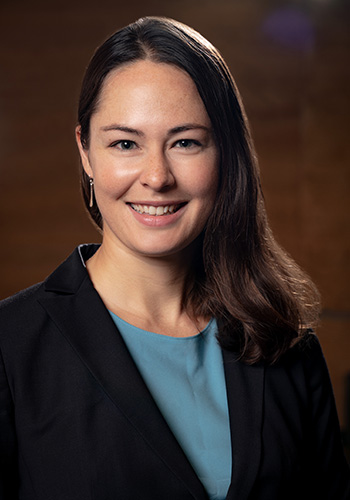Meet Sociology Prof Amanda McMillan Lequieu
March 31, 2020
Amanda McMillan Lequieu, PhD, is an assistant professor in the Department of Sociology and an environmental sociologist of work and home. She studies how working-class communities impacted by natural resource economies adapt to globalizing economies and changing environments across rural and urban contexts.

Degree: PhD in Sociology, University of Wisconsin-Madison
Research interests: human-environment relationships in both cities and the country
Hometown: the tiny village of Herminie, Pennsylvania
What did you do before coming to Drexel?
I was a visiting scholar at the Department of Environmental Studies at the University of California Santa Barbara.
What book, movie, show or podcast would you recommend?
My top recommendations for the past few years: Wallace Stenger’s “Crossing to Safety” and collected short stories, for stunning writing. “H is for Hawk,” by Helen MacDonald, for a memoir and biography that you can’t quite forget after you’re done. “Homegoing” by Yaa Gyasi, for remarkable storytelling across time and space. Kai Erikson’s “Everything in Its Path” for accessible and moving sociology.
What is your favorite thing about Philadelphia?
Before the coronavirus changed the way I interacted with my community and students here in Philly, my answers would’ve quickly been the beautiful skyline, easy access to nature, or the endless food options within walking distance. But since attempts to mitigate this pandemic sent us indoors, I’ve been blown away by how my neighbors in West Philadelphia are coming together to support each other. As I’ve watched online support groups, flyers offering support left on doorsteps, and food redistribution programs pop up in this neighborhood, I’ve realized that my favorite thing about this city is its remarkable people.
What have you been working on recently?
I’m turning my dissertation into a book. It profiles two, now-deindustrialized natural resource communities — one rural, one urban — to explore how long-term residents of marginalized places negotiate identities, cultures and economies over time.
What would students be surprised to learn about you?
I have had a series of intensive hobbies over the past several decades: I bought a horse as a child (who is happily retired on my parents’ farm) and competed in 4-H horse shows for years; I used to play the marimba and xylophone in my college’s percussion ensemble; and I am an amateur painter who has sold a series of paintings in the past few years.
When is the last time you did something “for the first time”? What was it?
While living in Santa Barbara last year, I learned how to surf! While I never got very skilled at it, what a special way to experience the moods, power, and beauty of the ocean.
What/who inspires you?
As a qualitative sociologist, I conduct interviews with working-class people who have experienced a lot of change — on their farms, in their villages and cities, and in their natural resource-based communities. Conversation after conversation, I am inspired by the resilience, tenacity, honesty and humor of these people.
What was an impactful moment from your own college career?
While attending a liberal arts college, I didn’t study abroad. Rather, I spent a summer doing research for my final thesis in Swaziland. Conversations I had with my professors, both before and after traveling solo for two months, were so important for helping me understand what I learned about this small country’s politics, land laws and culture. I use that experience as a model for the conversations I have with students coming back from their co-op adventures.
Which current event/issue do you think students should know more about, and why?
Many students excited about taking environmental sociology, one of the classes that I teach, are passionate about finding ways to influence policy, society and technology to stop environmental damage. I am excited to connect those concerns with an easily-overlooked problem with systemic change: infrastructures. Which infrastructures already exist shape the possibilities for the future: Cities that have existing public transportation systems can more easily shift towards more sustainable and less polluting transportation systems than those that were built around cars. Infrastructures are more than just those existing physical systems, too — they’re the software that organizes us, internet that connects us, public places where we congregate, and policies that encourage certain land uses. Changing the environment for the better requires re-imagining each part of the web that makes our world work!